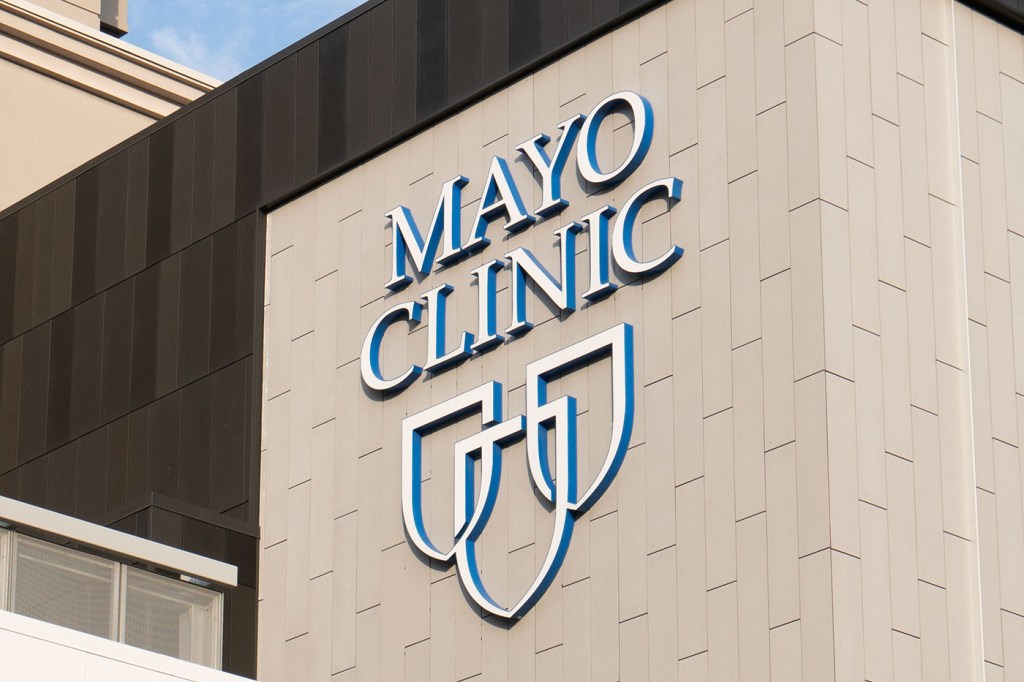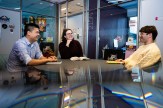Northeastern, Mayo Clinic join forces to prepare healthcare leaders for the digital revolution

The digital revolution of the healthcare industry rapidly accelerated during the pandemic with widespread use of telemedicine and other technologies. And there’s a pressing need to prepare talent for the innovations in an industry with 22 million healthcare workers in the U.S., including 9.8 million doctors, nurses, and healthcare technicians.
In anticipation of the new era in healthcare, Northeastern University and the Mayo Clinic College of Medicine and Science, the teaching hospital division of the Mayo Clinic, the nation’s top-ranked hospital system, have announced a unique partnership to harness the healthcare and business expertise at both institutions to offer an online master’s management degree in digital healthcare transformation.
The goal: Help the industry prepare its people and those from outside industries to lead and innovate the next generation of healthcare delivery by developing both their management and digital expertise. The program launches in the spring of 2022.
The collaboration speaks to the promise of what can be achieved when Northeastern, a leader in experiential education, joins forces with an institution known around the world for patient-centered medicine.
“This program is going to create that next generation of innovators who will improve healthcare globally,” says John Halamka, M.D., president of the Mayo Clinic Platform, digital healthcare initiative and co-director of the course.
“The last 18 months of COVID-19 have taught us there’s a new normal. That means we’re going to have more virtual care. We’re going to have unique technologies for the rest of our lives,” adds Halamka, an emergency room doctor, healthcare technologist, and the author of several books. “Now is the time to develop those skills.”
Northeastern faculty from the D’Amore-McKim School of Business and the Bouvé College of Health Sciences will co-teach select courses with Mayo Clinic faculty. Some of the Northeastern professors are experts in areas such as innovation, business management, change management, and digital technology. Others are medical doctors, former hospital executives and consultants to major medtech companies.
“We have people who have clear insight into where healthcare is headed―spanning the continuum of care, including in the home, and others who know how data and analytics drive better, more personalized care,” says Northeastern’s Marc Meyer, the Robert J. Shillman professor of entrepreneurship and the Matthews distinguished professor.
He is teaching a course on innovation for new products, systems, and services. Meyer believes that healthcare transformation is the redesign of the healthcare delivery system to do better serve the needs of the patient and their loved ones.
“The frameworks and methods we will teach will help students synthesize creative design, medical science, and digital technologies to do some good for the world. That is what makes healthcare transformation, and this program, so special.”
A critical component of the Northeastern-Mayo Clinic program is that it is employer-driven and arranged around clear career outcomes. The one-year program is modular, so students can earn a certificate in one of three specialized areas, or take all three certificates to earn a master’s degree. Soft skills subjects such as leadership, communication and creativity are also on the curriculum.
Another advantage is the program’s scalability, which harnesses the flexibility of distance learning to reach many people at the same time. This allows for a community of multi-disciplinary learners to meet multi-disciplinary experts, says Halamka.
“It is hard if you’re doing an on-premise course to bring together the best person from Asia, the best person from Europe, the best person from across the world,” Halamka says. But with the online management degree, “we’ll be bringing together the world’s experts. You will have access to a brain trust through distance learning unlike any on-premise class could ever offer.”
The idea for the masters in digital healthcare transformation was generated by Fred Meyer, M.D., a Mayo Clinic neurosurgeon, and the Juanita Kious Waugh Executive Dean for Education, Mayo Clinic College of Medicine, together with the leadership and faculty of Northeastern’s D’Amore-McKim School of Business.
Dr. Meyer wanted his medical students to be able to participate in improving the delivery of healthcare beyond their own specific practices, as organization-level thinkers and managers, according to Northeastern officials behind the partnership.
It later became clear that there was a much broader audience than just medical students and physicians―nursing staff and case managers, hospital and clinic administrators, operations, supply, and financial staff, pharmaceutical managers, IT professionals, and others could also benefit.
The year-long program will draw from a pool of early- to mid-career healthcare professionals who want to move into the business side of the field as management, or people in management positions in other industries who want to move over to healthcare.
“It’s not just about healthcare leaders and managers,” says Deanna Raineri, who develops strategies to grow lifelong learning and experiential programs as Northeastern’s vice president and senior vice chancellor for experiential digital global education.
“This program is also for clinicians, nurses―anybody who is dealing with the changes that are transforming healthcare.”
The Mayo Clinic and Northeastern designed a program that is both social, so as to build community across groups of students, and heavily experiential, with students learning and applying what they have learned on specific projects.
“I have worked with Northeastern for many years,” says Mayo Clinic’s Halamka. “If we’re going to look at the next six quarters, the next six years, of digital health, there’s no better place for this kind of course.”
For media inquiries, please contact media@northeastern.edu.





